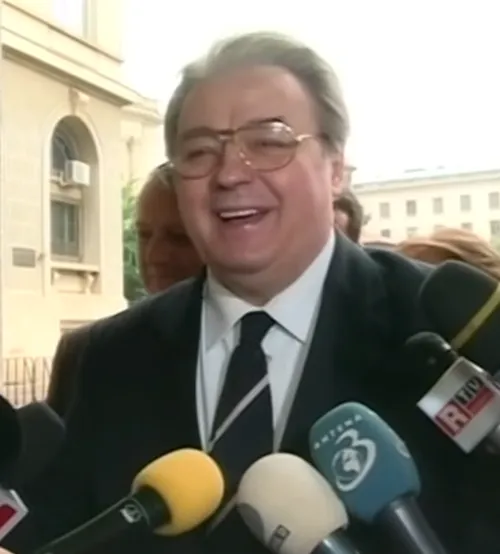In 2022, the world mourned the passing of Queen Elizabeth II as her coffin was transported from Buckingham Palace on a gun carriage of The King's Troop Royal Horse Artillery. A solemn procession led to Westminster Hall, where the Queen lay in state for four days, with mourners forming a lengthy queue along the River Thames to pay their final respects.
On September 14
13
Important Days
57
Important Events
405
Births and Deaths
recorded.
Holidays and Occasions
Events
Births and Deaths

Engineer’s Day in Romania: A Tribute to Innovation and Engineering Excellence
Every year on November 14th, Romania celebrates Engineer's Day, a special occasion dedicated to recognizing the contributions of engineers in various fields. This day not only honors the profession but also emphasizes the critical role engineers play in the development and modernization of the country...

Celebrating Hindi Day: Honoring the Rich Linguistic Heritage of Hindi-Speaking States in India
Hindi Day, celebrated annually on September 14, marks the adoption of Hindi as one of the official languages of India. This day is a poignant reminder of the rich cultural and linguistic heritage that Hindi-speaking states have contributed to the nation...

Mobilized Servicemen Day in Ukraine: A Tribute to Courage and Sacrifice
Mobilized Servicemen Day in Ukraine is a significant observance dedicated to honoring the courage and commitment of those who serve in the military. This special day acknowledges the sacrifices made by servicemen who have been called to serve their country, particularly in times of crisis...

San Jacinto Day: Honoring Nicaragua's Fight for Independence
San Jacinto Day, celebrated on September 14, is a significant national holiday in Nicaragua that commemorates the victory of Nicaraguan forces over the filibusters in the Battle of San Jacinto in 1856. This battle was a crucial moment in Nicaragua's struggle for sovereignty and independence, marking a turning point in the nation’s history...

Aelia Flaccilla: A Beacon of Faith in the Eastern Orthodox Church
Aelia Flaccilla, a figure of profound significance in the Eastern Orthodox Church, remains a symbol of piety and devotion. Little is known about her early life, but her legacy lives on in the annals of Christian history, particularly as the wife of Emperor Theodosius I and the mother of two prominent saints...

Cormac mac Cuilennáin: The Legacy of the King of Cashel
Cormac mac Cuilennáin, a distinguished figure in Irish history, was the King of Cashel during the 9th century. Known for his teachings, religious reforms, and architectural contributions, Cormac's influence shaped the Irish landscape, both politically and spiritually...

Crescentius of Rome: The Influential Abbot and Martyr
Crescentius of Rome, often referred to as Saint Crescentius, is a pivotal figure in early Christian history, known for his devout life and tragic martyrdom. His story unfolds during a time of significant religious upheaval in the Roman Empire, particularly during the 3rd century when Christians faced persecution under Emperor Diocletian...

Understanding the Feast of the Cross in Christianity
The Feast of the Cross, also known as the Exaltation of the Holy Cross, is a significant Christian observance celebrated on September 14 each year. This feast commemorates the discovery of the True Cross by Saint Helena, the mother of Emperor Constantine, and the dedication of the Church of the Holy Sepulchre in Jerusalem...

Exploring the Elevation of the Holy Cross in Eastern Orthodox Tradition
The Elevation of the Holy Cross, celebrated on September 14th, is one of the most important feasts in the Eastern Orthodox Church. This day commemorates the discovery and elevation of the True Cross, the instrument of Christ’s crucifixion, and reminds the faithful of the significance of the Cross in their spiritual journey...

Discovering the Lord of Miracles of Buga: History, Faith, and Cultural Significance
The Lord of Miracles of Buga, known in Spanish as Señor de los Milagros de Buga, is a revered figure located in the city of Buga, in the Valle del Cauca region of Colombia. This miraculous representation of Jesus Christ has captured the hearts of thousands, drawing visitors from across the globe who come to witness the profound spiritual significance and miraculous tales associated with this holy icon...

Saint Louis Gabriel Taurin Dufresse: Martyr of China
Saint Louis Gabriel Taurin Dufresse, a prominent figure among the Martyr Saints of China, represents both a significant religious figure and a devoted missionary who faced great trials in the pursuit of spreading the Gospel. Born in 1750 in France, Dufresse's journey led him to China, where he dedicated his life to faith, cultural exchange, and ultimately, martyrdom...

The Legacy of Maternus of Cologne: Patron Saint and Early Bishop
Maternus of Cologne, known as one of the significant early Christian figures in Germany, holds a revered place as the patron saint of Cologne. His contributions to the spread of Christianity and his legendary life make him a fascinating subject for both historical inquiry and spiritual reflection...

Notburga: Patron Saint of Servants and Her Miraculous Legacy
Notburga, renowned as the patron saint of servants and peasants, holds a significant place in the hearts of many Catholics, especially in Europe. Celebrated on September 14th, St...














